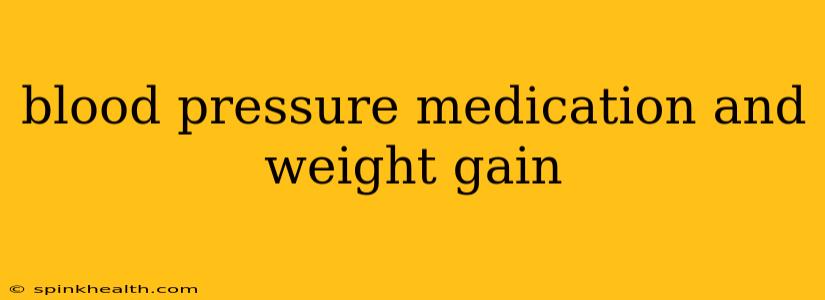Many people begin taking blood pressure medication to improve their heart health, but sometimes, an unwelcome side effect emerges: weight gain. This isn't necessarily a given, and the reasons behind it are complex, but understanding the connection is crucial for managing both your blood pressure and your weight. Let's delve into this common concern.
My name is Dr. Evelyn Reed, and I've spent over 15 years working as a cardiologist, witnessing firsthand the impact of blood pressure medication on my patients' lives. This article draws upon my experience and the latest research to give you a clear understanding of this issue.
What Blood Pressure Medications Cause Weight Gain?
This is a common question, and unfortunately, there's no single simple answer. Several classes of blood pressure medications have been linked to weight gain, although the extent varies significantly from person to person and even from medication to medication within a class. Some of the most commonly implicated medications include:
- Beta-blockers: These medications work by slowing down the heart rate and relaxing blood vessels. While effective for lowering blood pressure, some individuals report weight gain as a side effect. This is often linked to fluid retention and a potential decrease in metabolic rate.
- Calcium channel blockers: These medications relax blood vessels, but some, particularly those ending in "-dipine," can cause weight gain, again often due to fluid retention.
- Thiazide diuretics: Ironically, while some diuretics help with weight loss by increasing urination, thiazide diuretics can sometimes lead to weight gain, especially in the longer term. This is a complex interaction, and the mechanism isn't fully understood.
- Mineralocorticoid receptor antagonists (MRAs): These medications, such as spironolactone, can cause increased appetite and fluid retention, leading to weight gain.
It's crucial to remember that not everyone taking these medications will experience weight gain. Individual responses vary considerably depending on factors like genetics, diet, exercise habits, and the specific medication dosage.
How Much Weight Gain Can I Expect?
The amount of weight gain varies greatly. Some people might experience only a few pounds, while others might gain significantly more. The degree of weight gain is influenced by several factors, including the type of medication, dosage, individual metabolism, and overall lifestyle. There's no single definitive answer to this question.
How Can I Prevent or Manage Weight Gain From Blood Pressure Medication?
Even if your medication is linked to weight gain, there are several strategies you can employ to mitigate the impact:
- Diet and Exercise: This is paramount. A balanced diet low in processed foods, saturated fats, and sugars, combined with regular exercise, can significantly reduce the risk of weight gain or help you manage any weight increase.
- Regular Monitoring: Keep a close eye on your weight and discuss any significant changes with your doctor. They can assess if adjustments to medication or lifestyle are needed.
- Talk to Your Doctor: Open communication with your doctor is essential. They can discuss potential alternatives if weight gain becomes a significant concern. They may also be able to suggest strategies for managing the weight gain.
Are There Alternatives to Blood Pressure Medications That Don't Cause Weight Gain?
Yes, there are. Many other blood pressure medications are available that are less likely to cause weight gain. These might include ACE inhibitors, ARBs, and certain types of diuretics. Your doctor can help you determine the best option based on your individual health profile and medical history.
Can I Stop Taking My Blood Pressure Medication if I'm Gaining Weight?
Absolutely not. Never stop taking your blood pressure medication without first consulting your doctor. Stopping abruptly can have serious consequences for your cardiovascular health. Your doctor can help you develop a plan to manage both your blood pressure and your weight effectively.
What Lifestyle Changes Can Help Manage Blood Pressure and Weight?
Adopting a healthy lifestyle encompassing regular exercise, a balanced diet, stress management techniques, and sufficient sleep are crucial for both blood pressure control and weight management. These lifestyle changes are often more effective when combined with medication.
Remember, managing high blood pressure is crucial for preventing serious health complications. While weight gain can be a side effect of some blood pressure medications, it's not inevitable, and there are strategies to minimize its impact. Open communication with your doctor and a commitment to a healthy lifestyle are key to effectively managing both your blood pressure and your weight.

